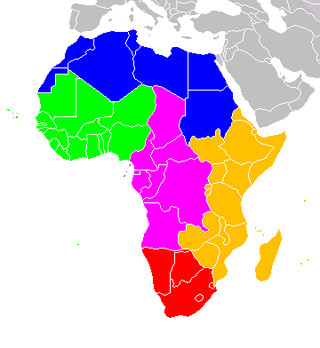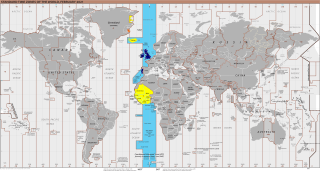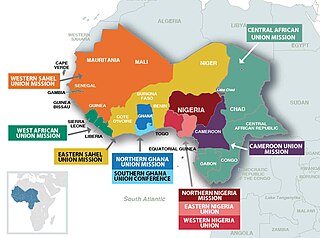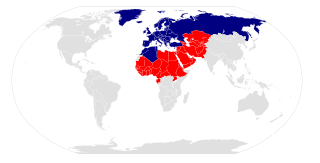
ATLANTIS-2 is a fiber optic transatlantic telecommunications cable connecting Argentina, Brazil, Senegal, Cape Verde, Spain's Canary Islands and Portugal. It is the first submarine cable to link South America and the African continent.

The African palm swift is a small swift. It is very similar to the Asian palm swift, Cypsiurus balasiensis, and was formerly considered to be the same species. The Malagasy palm swift was also recently split from this species. This is a common species with a very wide distribution which faces no obvious threats and may be increasing in numbers as a result of the cultivation of the exotic Washington palm, so the International Union for Conservation of Nature has rated its conservation status as being of "least concern".
Liberia Airways was an airline based in Liberia.

The individual member states of the African Union (AU) coordinate foreign policy through this agency, in addition to conducting their own international relations on a state-by-state basis. The AU represents the interests of African peoples at large in intergovernmental organizations (IGO's); for instance, it is a permanent observer at the United Nations' General Assembly.

The following is an alphabetical list of subregions in the United Nations geoscheme for Africa, used by the United Nations and maintained by the UNSD department for statistical purposes.

UTC+00:00 is an identifier for a time offset from UTC of +00:00. This time zone is the basis of Coordinated Universal Time (UTC) and all other time zones are based on it. In ISO 8601, an example of the associated time would be written as 2069-01-01T12:12:34+00:00. It is also known by the following geographical or historical names:
The athletics competition at the 2003 All-Africa Games was held at the Abuja Stadium between 11 and 16 October 2003. The host nation, Nigeria, topped the medal table.

The Trans–West African Coastal Highway or TAH 7 is a transnational highway project to link 12 West African coastal nations, from Mauritania in the north-west of the region to Nigeria in the east, with feeder roads already existing to two landlocked countries, Mali and Burkina Faso.
Elysian Airlines is a cargo airline based at Yaoundé Nsimalen International Airport in Yaoundé, Cameroon, and had additional significant operations at Spriggs Payne Airport in Monrovia, Liberia, and at Conakry International Airport in Conakry, Guinea. According to the airline's website, it was founded in January 2006 as a public limited company, with 51% of shares held by a Cameroonian consortium and the remainder owned by a British/South African group. Elysian's scheduled operations stopped in 2010, but resumed in 2015.

The West-Central Africa Division (WAD) of Seventh-day Adventists is a sub-entity of the General Conference of Seventh-day Adventists, which coordinates the Church's operations in 22 African countries, which include Benin, Burkina Faso, Cameroon, Cape Verde, Central African Republic, Chad, Congo, Equatorial Guinea, Gabon, Gambia, Ghana, Guinea, Guinea-Bissau, Ivory Coast, Liberia, Mali, Mauritania, Niger, Nigeria, Senegal, Sierra Leone, and Togo. Its headquarters is in Abidjan, Côte d'Ivoire. Founded in 2003, the division membership as of June 30, 2021 was 889,196.
The GLO-1 (Globacom-1) submarine communications cable is a cable system along the west coast of Africa between Nigeria and the UK, owned by Nigerian telecoms operator Globacom.

German air passenger taxes are excise duties and other charges levied by the German government on most passengers departing by air, either in addition to the price of the airline ticket or incorporated into the ticket price.
Groupe Air Sénégal, operating as Senegal Airlines, was an airline with its head office on the property of Léopold Sédar Senghor International Airport in Dakar, Senegal. It operated a scheduled network in Senegal and neighbouring countries from its main base at Léopold Sédar Senghor International Airport.

Tourism is an important economic sector for many countries in Africa. There are many countries that benefit heavily from tourism like Kenya, Uganda, Algeria, Egypt, South Africa, Morocco, Tunisia, Ghana and Tanzania. The touristic particularity of Africa lies in the wide variety of points of interest, diversity and multitudes of landscapes as well as the rich cultural heritage. Also, an ecotourist industry is present in some African countries.

The 2nd African Youth Games took place in Gaborone, Botswana's capital city from 22 to 31 May 2014. The Games featured approximately 2000 athletes from 51 African countries competing in 21 sports. Gambia, Eritrea and Mauritania were the only African countries absent from the Games.
Shelter Afrique Development Bank (ShafDB), also known as Company for Habitat and Housing in Africa, is a pan-African finance development bank created to exclusively support the development of the African real estate and housing sector. Through its strategic partnerships, it offers products and related services which support the efficient delivery of commercial real estate and affordable housing.
La Guinéenne de la Large Bande is a limited company in charge of managing the capacity allocated to Guinea on the Africa Coast Europe submarine cable (ACE) since March 2013.

The African Judo Union (AJU) is the governing body of judo in Africa. It is one of the five continental confederations making up the International Judo Federation (IJF). AJU was formed on 28 November 1961 in Dakar (Senegal). AJU has headquarters in Madagascar and consists of 54 member federations.















